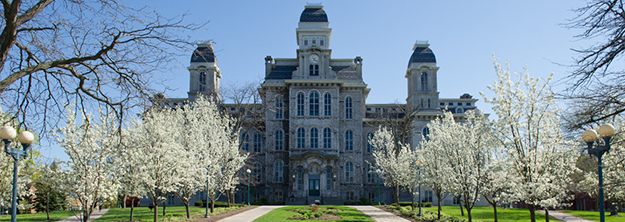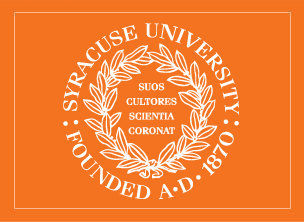
Ellie Prather ’15
Ellie Prather is a Child and Family Studies major, with a minor in Health and Wellness, in the Falk College. However, her talents extend far beyond her academics. Prather has worked in healthcare, nonprofits, student organizations and on research projects, always with the goal of helping others. Whether it is starting a breast cancer prevention group on campus or attending an international conference on building clinician peer support programs after medical error, Prather applies her knowledge from her time at Syracuse University and uses the experience to better herself and others. After graduation, Prather will pursue a career in public health, advocating for positive social change and increased care and awareness for underprivileged groups.
Q: How did you land on Child and Family Studies, and now that you’re nearing graduation, how do you feel about your experiences with the program?
A: I started as a communications and rhetorical studies major, but it just wasn’t clicking for me. So, I switched to child and family studies. I was hooked right at the start with the child development courses, and as I progressed through the coursework, I realized how many different areas the major can be applied to. I needed a bit more direction and focus within the major, so I chose health and wellness as a minor. I was very pleased with this combination and helped me realize I want a career within the health and wellness of children and families.
Q: What about internships? Where have you worked, and what have those experiences taught you?
A: The summer before my senior year I was accepted into the Boston University Summer Study Internship Program on the public health and social policy track. I took two anthropology classes, one being medical anthropology, which was incredible, and I was able to transfer those credits back to Syracuse. Getting ahead in my coursework allowed me to spend more time on my student organization and research position.
Next, I worked with a nonprofit called Medically Induced Trauma Support Services. I had no idea how prevalent medical error is, so being an assistant to the CEO of the organization provided me with valuable experiences and opportunities. For example, I got to attend a meeting at the Massachusetts Coalition for Prevention of Medical Error. All of these people that care so much about quality health care came together in the same place, and hearing them speak about their work was incredibly educational. What I found most interesting was the focus on supporting clinicians who have made errors, not solely the patients who have experienced them. One of the biggest issues is that so many doctors, nurses, anesthesiologists and other hospital employees are not given a proper emotional outlet to grieve when an adverse event takes place. It was very inspiring to see these individuals take a step back and realize that they are each other’s most valuable resources.
Q: You’ve also created a successful on-campus group to combat breast cancer. How did that start and what is some of the work you do?
A: The group is called Protect Our Breasts, and I started it my junior year here at Syracuse. My friend’s mom beat breast cancer a few years ago, and started this group at the University of Massachusetts, where she’s a professor. I’ve always had close ties with their family, so when she asked me if I would be interested in starting a chapter at Syracuse University, the immediate answer was, “Of course.” Protect Our Breasts is all about breast cancer prevention and educating the community about the problem, and that’s something I couldn’t have done without the support I got from the students on this campus.
It’s all about the power of teamwork; I started it myself, and then it expanded to my friends, and now I have this really solid group of girls who are truly passionate about it. We want to raise awareness about the environmental toxins linked to breast cancer, and hopefully motivate people to live healthier lives. When you really do the research, it’s astounding how many harmful chemicals are in deodorants, lotions, cosmetics; things that we voluntarily put all over our bodies every day. So, if I can educate someone and give them good information, and then they get rid of their bad products and lead a more conscious and healthier lifestyle, there is potential that the individual prevented the unforgiving disease from entering their life. That thought motivates me to do this work and impact as many people as we can.
Q: On top of that, you’re a research assistant with Project Ethics. What do you work on and how does it relate to your intended career?
A: Most simply put, it’s research about research. We’re doing research about the inclusion of adults with intellectual disabilities in research. A lot of times people assume that intellectually disabled individuals cannot give consent for themselves, and are hesitant about all the ethical issues that could potentially arise. We are seeking to gain a better understanding of these views. The study has consisted of focus groups, an expert panel, and then stage three was our survey. We are currently writing the manuscript. I have been involved in the study for two years now, and being on the inside of such a big research project, watching it evolve and grow, has been a wonderful experience. I was drawn to this study because of the focus on adults with intellectual disabilities. This is a study for a vulnerable population of people, and I’ve always felt very strongly about raising awareness for an underserved population.
Q: Are there any other ways that you’re involved on campus that you feel have contributed positively to your experience here?
A: I’ve thoroughly enjoyed being a peer advisor to the freshmen on campus. I pride myself in my abilities to stay on top of my coursework, get good grades, maintain good relationships with my professors and effectively time manage with all my additional positions. Therefore, I was excited to pass this knowledge on to the freshmen. The transition into college can be a difficult one, and I was grateful to be able to support them during that time.
Story by Austin Galovski, work-study in the Office of News Services




